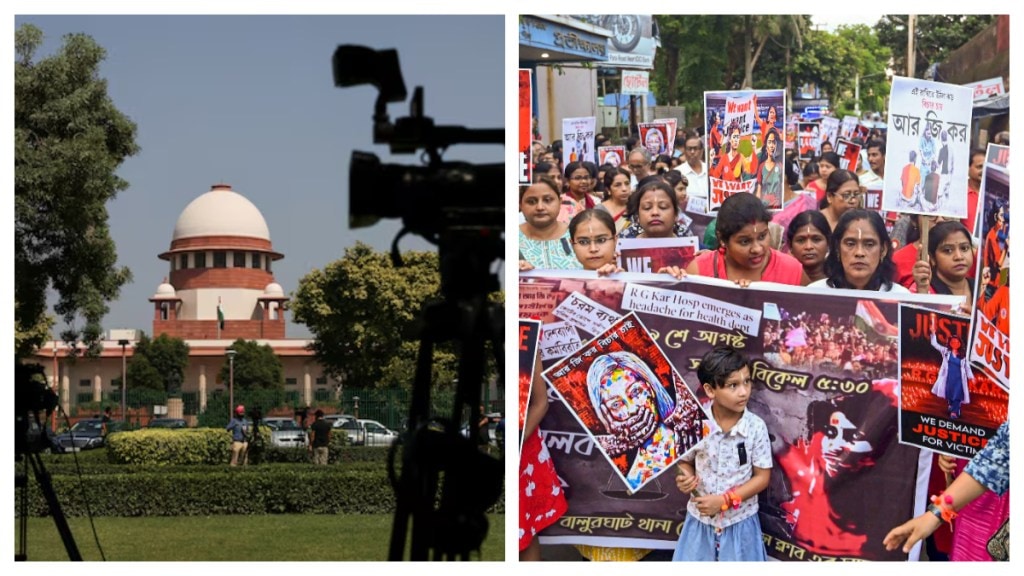SC Hearing Updates on Kolkata Doctor Rape-Murder Case: A Supreme Court bench led by Chief Justice DY Chandrachud convened to address a suo motu case concerning the rape and murder of the female trainee doctor at RG Kar Medical College and Hospital in Kolkata on August 9. The CJI emphasized that this case highlights a broader, systemic issue related to the safety of doctors across the country. The Court also expressed strong disapproval of the West Bengal government’s mishandling of law and order and the delay in filing an FIR, which occurred three hours after the victim’s body was cremated. Additionally, the Supreme Court announced the creation of a National Task Force tasked with developing an action plan to prevent gender-based violence and ensure safe and dignified working conditions for medical professionals.
Here are more key arguments and announcements made during today’s Supreme Court hearing.
Safety of doctors is an issue of national importance:
The Chief Justice of India, DY Chandrachud, emphasized during the hearing on the RG Kar Hospital incident that the safety issue extends beyond a single case, highlighting a systemic problem concerning the safety of doctors across the nation.
Why was this rape and murder case dismissed as suicide?
The Chief Justice noted that the crime was uncovered in the early morning, with the principal initially misclassifying it as a suicide and restricting the parents from viewing the body. He expressed concern over the delay in filing an FIR, which could suggest an attempt to conceal the murder. In response, Kapil Sibal contested this narrative, stating that an inquest was conducted and an FIR was filed without delay. Sibal affirmed that the inquest determined the case to be murder and confirmed that the accused, a civic worker, has been arrested.
Why was FIR filed 3 hours after cremation?
Describing the rape and murder of a medic at Kolkata’s RG Kar Medical College and Hospital as a horrific incident, the Supreme Court strongly criticized the West Bengal government for its delay in filing an FIR. The Chief Justice noted that the victim’s body was cremated at 8:30 PM, then why was the FIR was only filed three hours later at around 11:45 PM. The Chief Justice also wanted to know what the principal and hospital board were doing during this time. In response, Kapil Sibal explained that photos were taken, an unnatural death case was quickly started, and a board with a Judicial Magistrate was set up. The Chief Justice emphasized that the hospital was responsible for filing the FIR, especially since the victim’s parents were not at the hospital.
SC wraps West Bengal Government:
The Supreme Court emphasized that the West Bengal government should not use its authority to suppress protestors during this critical period of national reflection. The court highlighted that many young doctors are working up to 36 hours at a stretch and stressed the urgent need for a national protocol to ensure safe working conditions in healthcare settings. Solicitor General Tushar Mehta criticized West Bengal for being in denial about the situation, pointing out a significant breakdown in law and order. He also questioned how a mob of 7,000 could breach hospital security without the Kolkata Police’s awareness.
SC sets up National Task Force:
SC announced the establishment of the 10-member National Task Force which will be led by Surgeon Vice Admiral RK Sarian. The Court has directed the NTF to formulate action plans addressing two critical areas: (1) preventing all forms of violence, including gender-based violence, against healthcare professionals; and (2) creating a mandatory national protocol to guarantee respectful and secure working conditions for interns, residents, senior residents, and doctors. The Supreme Court has asked the NTF team to provide an interim report within three weeks and final report in two months. To facilitate the task force’s work, the Court has also enlisted the support of the Cabinet Secretary, along with the Home and Health Secretaries of the Union government.
CBI to submit status report by August 22:
Chief Justice D.Y. Chandrachud has directed all states to compile and submit comprehensive data on hospital security and facilities. This includes information on the number of security staff at each hospital, the total count of restrooms, and whether all areas are accessible to the public, among other critical details. States must deliver their reports within one month. Additionally, the CBI is required to present a status report by August 22, and the West Bengal government must also provide a report by the same date, outlining the vandalism incident at RG Kar Hospital.
CISF security at RG Kar Medical College and Hospital:
In response to the vandalism by a mob on August 14, the Supreme Court stressed the importance of enhanced security measures, especially given that many residents have since left the hospital. The counsel for young women doctors argued in the Court that before the night of vandalism, the medical staff was at the capacity of 700. But after the act of vandalism, only 60-70 male and 30-40 female resident doctors remain at the campus. The SC noticed the huge drop in numbers and ordered the CISF to bolster security at RG Kar Hospital.
West Bengal government’s failure to maintain law and order:
In a Supreme Court hearing regarding the RG Kar incident, Solicitor General Tushar Mehta criticized the West Bengal government for failing to acknowledge the severe breakdown in law and order. He also pointed out significant delays in filing the FIR and issues with tampering at the crime scene. Mehta further noted that the there is no way that a mob of 7000 people was able to enter the premises of the hospital without the knowledge of the Kolkata police, indicating a serious lapse in security.

